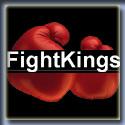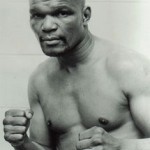


By George Hanson, Jr
If Bennie Briscoe was never born, we would have invented him. With the courage of a lion, the persistence of a beaver, and the indestructibility of a Sherman Tank, Briscoe was able to wreak havoc on the middleweight division for 20 years (1962- 1982). The boxing ring was his altar and worshiping fans packed venues all over the world to get a glimpse of the bald-pated, murderous body-punching fighter who according to his promoter, J. Russell Peltz, “slammed away at your foundation until it turned to chalk.” He was bigger than life and the personification of what it meant to be a  Philadelphia fighter—tough, relentless, resilient, unequivocal—bad! No fighter in the world was more dedicated to breaking their opponent’s will and demolishing their spirit by doling out punishment to the body. Hence, when I had the chance to meet Briscoe, I didn’t know whether or not to bow, genuflect or shake his hand. I was a teenager and it was before one of my amateur bouts at the Athletic Recreation Center at 26th and Master Streets in Philadelphia. I heard that Briscoe was in the building, so I rushed out of the basketball gym, which served as our dressing room, with my autograph book to view the legend and get his John Hancock. Tongue-tied, I introduced myself and asked for an autograph which he graciously gave and then wished me luck.
Philadelphia fighter—tough, relentless, resilient, unequivocal—bad! No fighter in the world was more dedicated to breaking their opponent’s will and demolishing their spirit by doling out punishment to the body. Hence, when I had the chance to meet Briscoe, I didn’t know whether or not to bow, genuflect or shake his hand. I was a teenager and it was before one of my amateur bouts at the Athletic Recreation Center at 26th and Master Streets in Philadelphia. I heard that Briscoe was in the building, so I rushed out of the basketball gym, which served as our dressing room, with my autograph book to view the legend and get his John Hancock. Tongue-tied, I introduced myself and asked for an autograph which he graciously gave and then wished me luck.
When I am old, sitting on my verandah in New Forest, Jamaica, I will tell folks about “Bad” Bennie Briscoe and how I got his autograph and shook his hand—the one that destroyed numerous dreams and sent so many to the hospital. I will also tell them about today and how in preparation for his 11am funeral, I woke early, made a pot of Blue Mountain coffee, poured myself a cup and sat and watched the only two fights that I have of his illustrious 96-fight-career (66 wins – 24 losses – 5 draws – 1 no-contest – 53 kos). Perpetual motion, raining down fury—he demolished Emetrio Villanueva in four rounds at the Spectrum in Philadelphia on August 16, 1976. Next up was a relentless 35-year-old Briscoe losing a 10-round unanimous decision, but earning the respect of a 24-year-old “Marvelous” Marvin Hagler, who wisely boxed on his toes refusing to engage the grizzled gladiator in a war of attrition. This spectacle also occurred at the Spectrum on August 24, 1978 in the presence of 14,950 fans, the largest indoor crowd in Pennsylvania for a non-championship fight. Like many aficionados of the sweet science, I have a preoccupation with history and thanks to technology I am able to absolve Briscoe of his mortality— paying homage to one of my heroes before making my way to the celebration of his life and legacy at the Deliverance Evangelistic Church at 2001 West Lehigh Avenue in North Philadelphia.
In my rocking chair, my dreads touching the floor, warding of glaucoma with a cigar made of that medicinal stuff, popular in Amsterdam, I will tell them how Uncle Russell, Promoter J. Russell Peltz, in a poignantly rebellious moment rightfully and righteously ignored the two-minutes allotted in the program for his remarks by opening with, “You don’t say good-bye to a piece of your heart in two minutes.” Immediately, my eyeballs started sweating and I am certain that many other eyes were moist with tears. Chronicling how he met Briscoe and became his promoter, Peltz stated, “Old- timers tell you, never fall in love with fighters because they will break your heart. But when you are a 22-year old….I fell in love with Bennie Briscoe, but he never broke my heart. He loved me and I loved him.”
Hopefully, my memory will be intact showing no signs of my time in the squared-circle and I will recollect how Peltz’s oratory touched everyone. He aptly said, “Bennie Briscoe made me.” Detailing Briscoe’s fifth round technical knockout of 22-year-old Australian knockout artist Tony Mundine (44 wins – 2 losses – 1 draw – 38 kos) in Paris, France, February 25, 1974, the promoter fondly recalled, “It was my biggest thrill ever in boxing, after the fight we all crowded in the dressing room that was so small it couldn’t accommodate a dwarf doing a somersault.” Time stood still and the over 200 in the church held on to every word of Uncle Russell, whose two minutes turned into a glorious half an-hour journey down memory lane placing us in the room not listening to, but reliving every moment with him and Briscoe. “Bennie Briscoe is family.”
With the warm Caribbean breeze blowing from the sea three miles away, visible from my back porch, I will tell them how Archie Glenn, Briscoe’s brother recounted how Bennie, the eldest, took care of his eight siblings in Augusta, Georgia when their mother Louis Glenn was ill. Peltz was the 12-round main-event and Glenn captivated us as the ten-round co-feature with his stories of his brother’s caring spirit and commitment to their family. “Mom’s proudest moment was in 1971 when Briscoe bought her a four-bedroom house with two bathrooms. I was a senior in high school.” As one of the ministers stated earlier, “the two minute protocol had been broken a while ago.” Glenn meticulously painted a beautiful masterpiece of his brother dipping his brush numerous times in the paint pallets of his memory. “If Briscoe had a million dollars he would give it away. He didn’t want to see anyone hungry. He knew what it is to be hungry.”
I recast the story of Briscoe’s funeral, I will recall that several members of the boxing community came to pay their respects, including former WBA light-heavyweight champion Eddie Mustapha Muhammad, who as a 23-year-old budding middleweight named Eddie “The Flame” Gregory dropped a 10-round split decision to Briscoe at the Spectrum on August 18, 1975. I chalked up a conversation with Lenny Harden, who lost to Briscoe in the 10th round at the Spectrum on January 14, 1975, as I exited the church. Philadelphia was once the capital of middleweight contenders and the remaining members of the cartel—Bobby “Boogalo” Watts, Stanley “Kitten” Hayward, Eugene “Cyclone” Hart and Willie “The Worm” Monroe—all came to say good-bye to their friend. Also in attendance were five of our former world boxing champions—The Honorable Judge Jacqui Frazier-Lyde, Buster “The Demon” Drayton, Nate “Mr.” Miller, Charles “The Hatchet” Brewer, and Robert “Bam Bam” Hines; former New Jersey State Boxing Commissioner and one of the greatest referees of all-time, Larry Hazzard; Pennsylvania Boxing Commissioner, Rudy Battle; Matchmaker, Renee “The Boxing Diva” Aiken; trainers Buster “Percy” Custus, Billy Briscoe and daughter – Julie Briscoe; journalists – Zoid Davis, John DiSanto, Earl Harvey and Don Steinberg; former middleweight contender Curtis Parker; and Cutman, Leon Tabbs. They all made the trip to North Philadelphia to celebrate the life of the “baddest” middleweight in Philadelphia’s rich boxing history.
With the contents of my cigar taking full effect, I know that philosophically I will be in full-stride when I relay writing this story about “Bad” Bennie Briscoe. I will let them know that instead of mourning his death I wanted to follow the old African tradition of celebrating life. Thus, this month’s announcement of departing Pennsylvania Governor Ed Rendell earmarking $6 million as part of the State Redevelopment Assistance Capital Program (RACP) for Mosaic Development Partners efforts to build an $18 million hotel and restaurant complex with a jazz bar and fitness center at The Legendary Blue Horizon—the movement was started to commission the bronze statue of “Bad” Bennie Briscoe to proudly sit in front of the hotel. This was a no-brainer, since the boxing Mecca was the venue of eight of Briscoe’s bouts, including his last one on December 12, 1982.
When I reminisce about Briscoe, I will relate what I wanted my readers to understand— why he meant so much, why we loved him so and why Bennie will live forever in our hearts, in our minds, and in our stories.
Continue to support the sweet science, and remember, always carry your mouthpiece!
great memoir about the late Briscoe. Listen to other recollections about him at
http://www.blogtalkradio.com/fightkings/2010/12/12/boxing-interviews